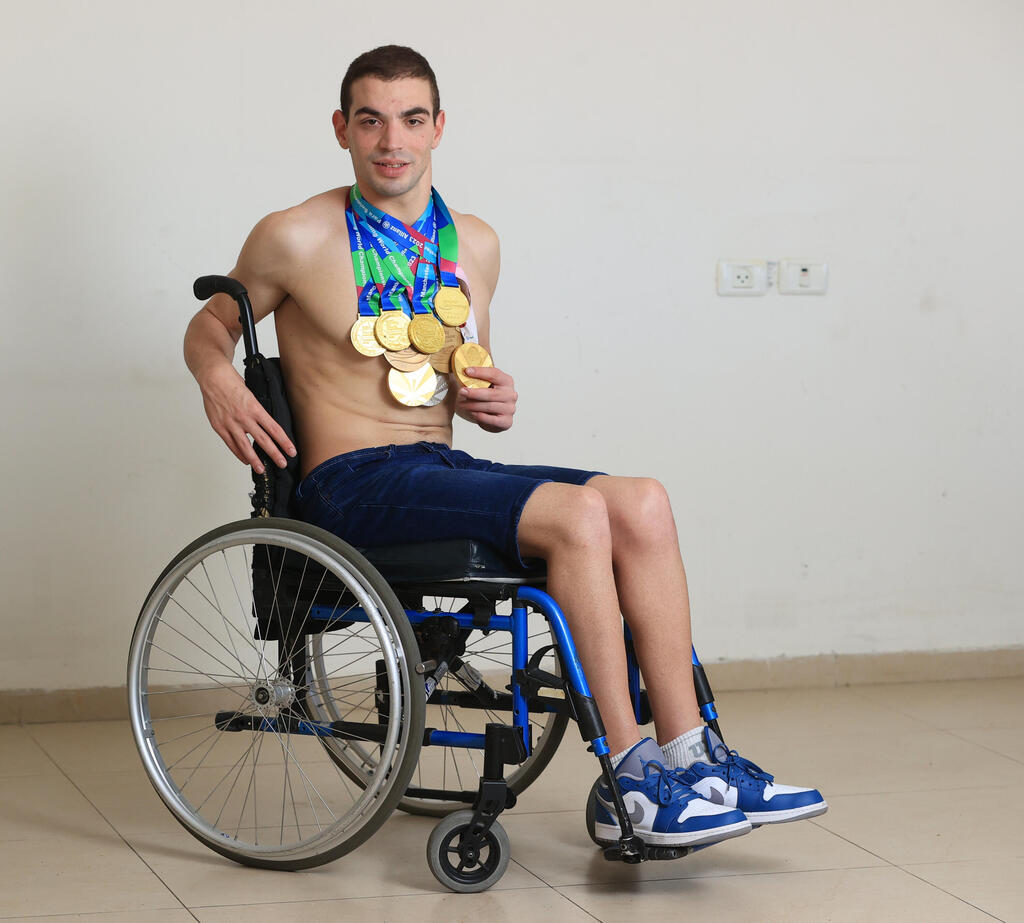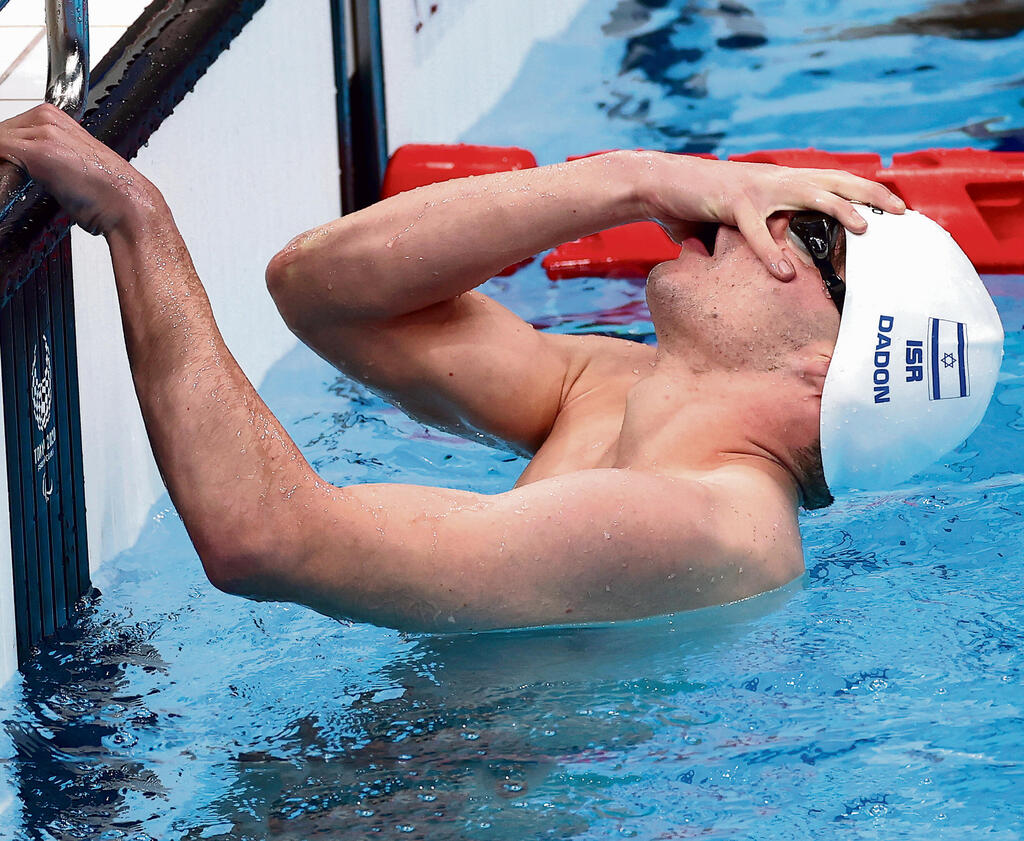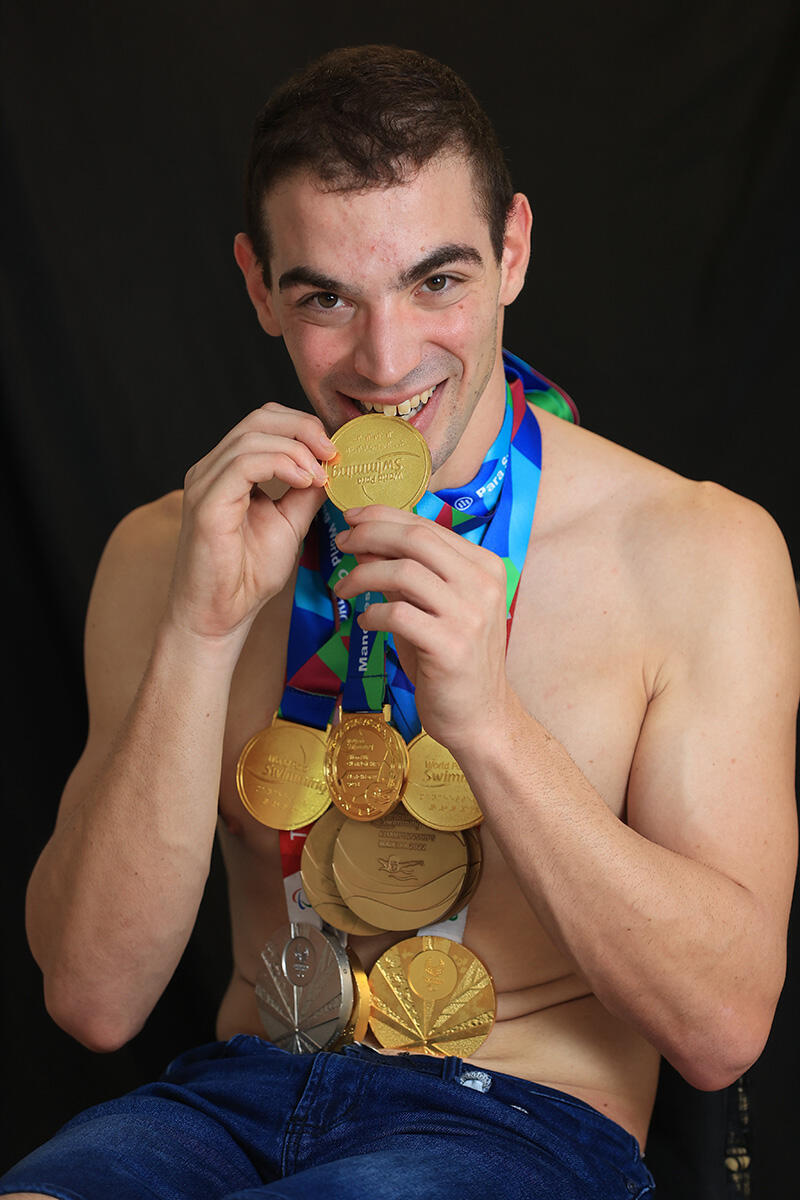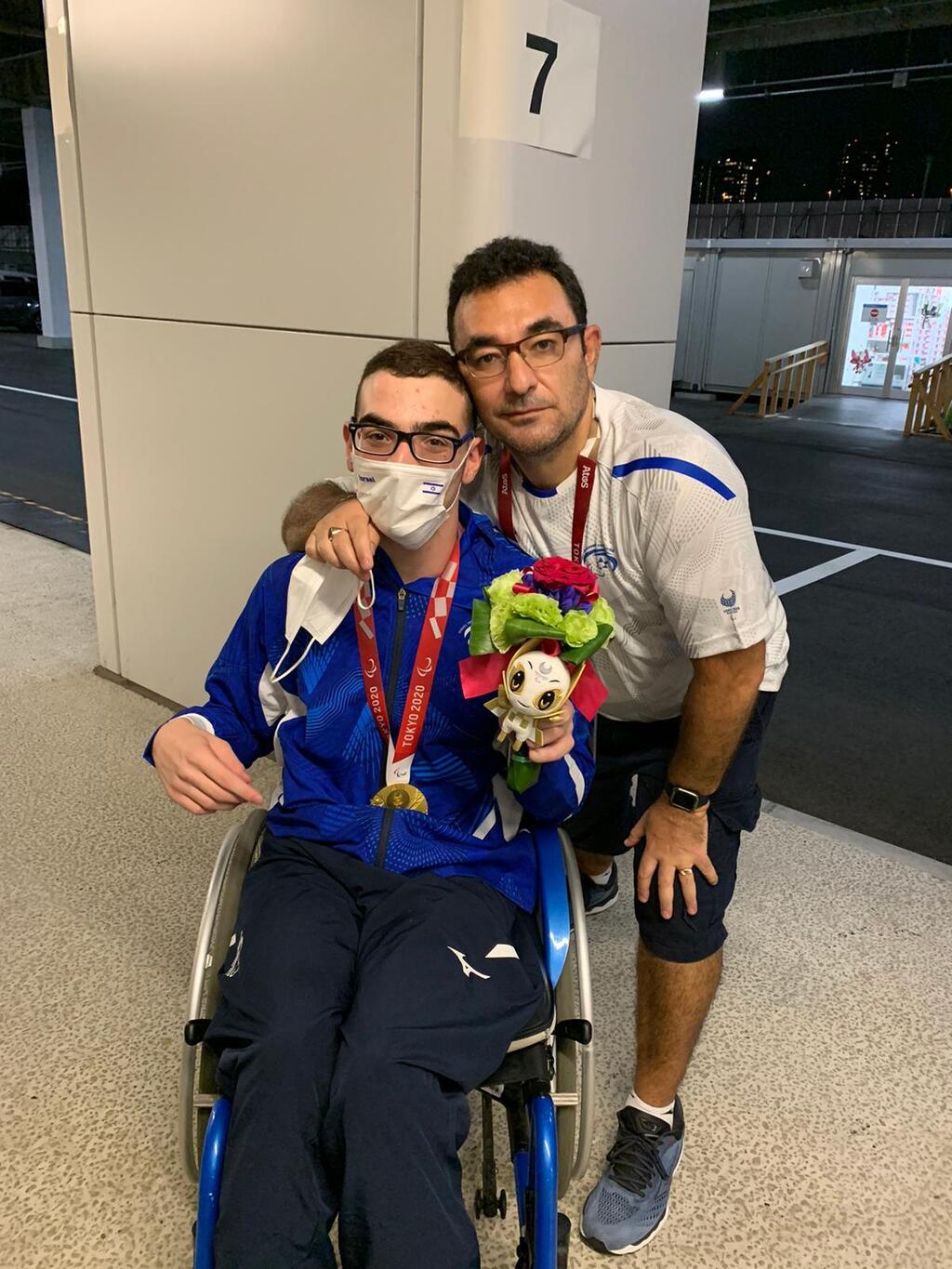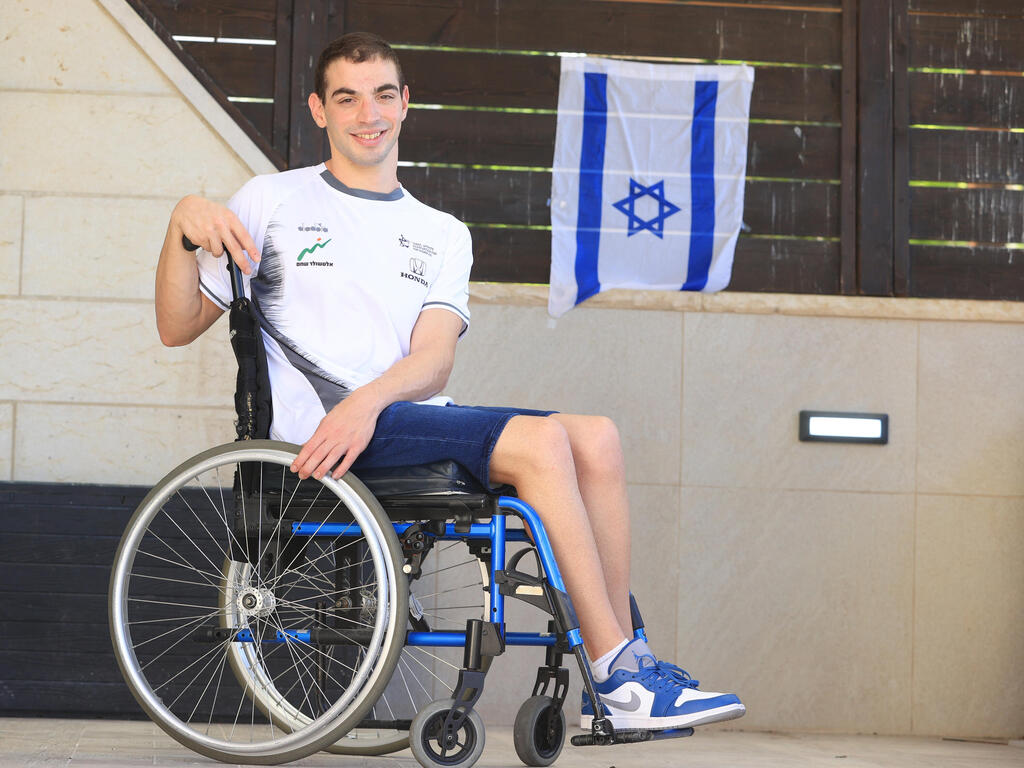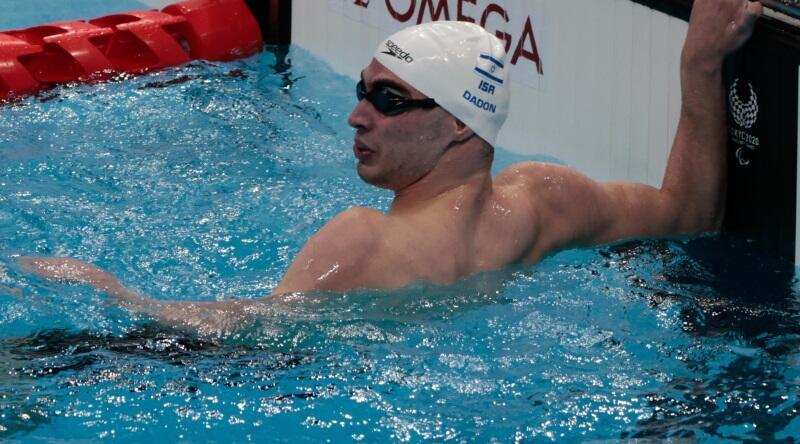The smile on Ami Dadaon's face is hard to miss. The 22-year-old para-swimmer wears it every time he steps onto the podium to receive another medal, and he has quite a collection.
Read more:
He recently returned from the World Championships in Manchester with four gold medals around his neck. In addition to his impressive victories in the 50m freestyle, 150m medley and 200m freestyle, Dadaon clinched gold in the 100m freestyle, setting a world record with a time of 1:18.94 minutes and securing his ticket to the Paralympic Games in Paris.
The young prodigy, who is in excellent form, has plenty of reasons to celebrate, but what lies behind the smile—when the ceremonies end and the cameras move aside—is something Dadaon keeps to himself.
The gap between the magical moments when he is in the water, doing what he does best and excels at, and the challenging times outside the pool, the persistent struggle, and life in Israeli society as a disabled person, can sometimes be too large for him to bear. So he pushes on, radiating jubilant smiles—he is, after all, not the type to dampen the party—but at times, the emotional toll becomes too complex for the young athlete, and the emotional strain seeps out.
Back on the right track
In a special interview with Yedioth Ahronoth and Ynet, Dadaon allows himself to open up, speaking candidly about the challenges, the moments he considered retiring, and the ongoing fight not to fall into what he calls "the victimhood zone".
"I won four gold medals. It’s a record for me, the most I’ve ever won. It’s my greatest professional achievement," he says with a proud, bittersweet tone, "It was a long, very hard season for me. Both in terms of my professional and personal life."
What happened in your professional life?
"At the beginning of the season, I experienced a crisis that was very hard to emerge from, like wanting to return to training as needed. This season lasted a year and two months, whereas usually, a season is nine to ten months. This happened because of COVID; the 2022 World Championships were early, and then there was also a break. We returned early, which resulted in a very long season. The body gets tired.
Yakov [Beinenson, the national team coach] found a solution and we overcame it. I found my way and my purpose, reignited my passion, and this led to the beautiful achievements in Manchester."
I understood that there were thoughts of retiring.
"Every professional athlete has moments of crisis, and to get out of them, you need strong character and to rediscover the reason why you are doing this, why you started doing this. You need to understand your past, your present, what this gives to you and to everyone who watches you, what it means to be a role model for young children who want to be like you. I simply realized that I am a model for many people, and I need to put myself aside for a moment and give these kids some direction."
And in your personal life?
“My personal growth has accompanied me a lot this year. I wanted to create success in my personal life just as I do in sports, and it was not easy. When I am in the water, I am an elite athlete with four gold medals. But when I return to Israel, I am ultimately a disabled person, to whom people sometimes relate differently, sometimes with pity.
"I have never pitied myself; I always see myself as a role model and someone who can positively influence people. But there is a very large gap between how I see myself and how I want people to see me, and how they actually see me in reality."
In what area do you want to succeed as much as in swimming?
"Mainly in how people relate to me. There is also a desire to develop in the direction of education and various other paths. Ultimately, it's about finding what I want to do in my adult life. This has been a year of many questions for me."
Questions that led to unrest?
"Yes, mainly questions in which I tried to understand what comes next, what is happening with me as a person, not just as an athlete. It was not easy for me. It also affected my preparation at certain times, but Yakov and Boris Ginzburg [the mental coach] helped me to overcome it."
‘I didn't give in to pressure’
Dadaon successfully emerged from his personal crisis and won four gold medals earlier this month at the World Championships in England. The Paralympic swimmer came to the competition decorated with a plethora of medals, which he began to collect since he was 18.
In Dadaon’s trophy cabinet, one can find five gold and three silver medals from the European Championships (2018, 2021), silver and bronze medals from the World Championships (2019), and most prestigious of all - two gold and one silver medal from the Tokyo Paralympic Games. With this resume, it was clear that the young Israeli came to Manchester with a bag of expectations on his shoulders.
"This year has led me to the conclusion that I cannot let myself down and must win in everything I do," he says. "Toward the end of the season, I trained very hard. I tried to ignore the background noise as much as I could. In the competition, I came and worked anew every day, forgetting the first medal and starting each stage as if it were a new race."
Do you think about the other competitors while swimming?
"No, I let my muscles do the work. I think I am an athlete who is capable of living with his emotions, as a person too. When they overtake me in the competition, I don't get stressed; I work according to my plan. I have complete faith in my plan and in Yakov's.
In the 150m medley, I was behind during the breaststroke, but I stuck with the plan during the freestyle. I wasn't afraid to perform at the end as I did. It does happen that I think about competitors before the race or after analyzing it. It sits in the subconscious that they see you, that you are someone who can take children out of their comfort zone, out of their victimhood zone, and help them build beautiful, independent and good lives."
What do you mean by ‘victimhood zone’?
"It means being less supported, being stronger, succeeding and understanding that even if you were born with a disability or acquired one during your life – it's not the end of the world. You can progress, succeed, achieve great things and be in a good place in all areas of life.
I attended a regular school, completed my high school diploma, majoring in computer science and biology. I didn't invest in my studies as much as in swimming, but it's possible to succeed in both areas. I tell children that it's important to study, because success and achievements are not guaranteed. Personal development happens within the context of sports."
‘I don't want to see water’
Dadaon, who grew up and lived in Kiryat Ata, was born premature with cerebral palsy and is disabled in all four limbs. At the age of six, he began training at the pool in the ILAN Haifa club, but as a child, he wasn't considered to have high potential, and it was believed that swimming would be more of a rehabilitative activity for him, rather than a competitive one.
Even before becoming his coach, Beinenson did not hesitate to tell the boy that he was not a swimmer. "We started working together at a relatively late age. Before that, he said that I was a good kid, but not suitable for the sport."
Did you want to prove him wrong?
"No. The moment Yakov saw that there was potential and room for progress, he immediately took me under his wing. We know how to work excellently together, and the responsibility, the victories and the failures are 50% on him and 50% on me.
We have a healthy relationship in which each of us can bring his strengths to the table. That is what led to my professional success. I wanted to prove to myself that I could be an athlete. The dream of swimming in the Olympics was there when I was still a child. I fulfilled it in Tokyo."
Your world records prove that you are not just an athlete, but one of the best.
"They are a bonus. After all, I swam and achieved the fastest time in the world ever. It helps, it's very flattering and I know that I am working well. Yakov and I are the best team in the world."
The child who was born quadriplegic is today a world champion and a young man who drives independently to his training sessions in his own car. "I am much more liberated and highly independent in my daily life," he explains. "A driver's license is freedom; it becomes your second pair of legs."
Dadaon has a twin sister ("We are very close, we talk about everything") and two more brothers, who are also twins, aged 13. It's unclear how much this relates to their character or the struggles they have been required to face since childhood, but Dadaon is very politically aware and is not afraid to say that he sees a parallel between what is happening on the streets and the treatment that disabled individuals receive in Israel.
"I generally believe that as a nation, we need to practice more 'love your neighbor as yourself.' There is a divide among us in the country right now, it's no secret. I don't represent only supporters or opponents of a certain reform that is currently a hot topic in Israel; as an Israeli athlete, I represent everyone. As a nation, we should be more open to different opinions, to people who have a slightly harder time and have certain limitations."
A year before the Paralympic Games in Paris, don't expect to see Dadaon in the pool anytime soon. He currently prefers to take a break. "My peace of mind was affected this year," he shares. "My searches for many things contributed to this. I am optimistic and believe that I will find my peace of mind again and what I am looking for. I am going to take time off from swimming."
To do what, for instance?
"To be honest? This year I realized that I don’t know what I love and what I want to do. Swimming drained a lot of energy from me. I want to see what I am capable of doing, maybe catch up with friends who were somewhat neglected in the past. Maybe find things I enjoy doing. Breaking the routine sometimes is very important. It gives a deeper sense of purpose."
And what about the Paralympics?
"I will return when my body and soul are ready for it. I don't want to limit myself with time. It will happen when I can give 100% physically and 100% mentally. Without that, I won't be able to achieve what I want in Paris. Yakov and I haven't talked about this yet. I don't know if he will apply pressure as time passes. We will find a solution; our bond is strong enough to find a common ground in this regard too. Right now, I don't want to see water; I can't stand the sight of the pool."
Not even going to the sea?
"I very much want to see the sea, actually. I haven’t been to the sea in a long time, and I can do that during the break. I will definitely do it."


